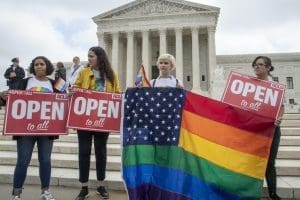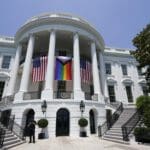Marriage equality hasn't stopped businesses from discriminating against gay couples
Marriage equality has been the law of the land for six years.

The 2015 Supreme Court decision in Obergefell v. Hodges that made marriage equality the law of the land was an enormous affirmation of the rights of same-sex couples. But many LGBTQ couples continue to face discrimination on the part of private businesses.
A same-sex couple in Ohio were told in an email from the Light on the Hill, a wedding venue they were interested in booking earlier this year, “Because of our Christian beliefs we do not believe in same sex marriages at the venue.”
In North Carolina, a wedding planner and estate called Highgrove Estate told two gay men who were looking for a place to hold their wedding that they “have chosen not to participate in same-sex weddings at this time” due to their “Christian values.”
In 2020, another North Carolina business, the Warehouse on Ivy, told a lesbian couple inquiring about their facility, “Unfortunately we do not host same sex marriage ceremonies.” In an email to NBC News, that business too emphasized its “Christian values.”
In Kentucky, two married women went to have their taxes prepared at Aries Tax Service on April 3 and found a sign on the tax preparer’s door that read, “Homosexual marriage not recognized.”
Photographers are suing state and local governments because they want to be able to discriminate freely against same-sex couples. In New York, Emilee Carpenter filed a suit in U.S. district court against Attorney General Letitia James for the right to post a “no same-sex weddings” policy on her website and said New York’s civil rights law violated her First and Fourteenth Amendment rights. A Kentucky photographer, Chelsey Nelson, sued the city of Louisville over its LGBTQ nondiscrimination ordinance.
The 2018 Supreme Court ruled in Masterpiece Cakeshop v. Colorado Civil Rights Commission on narrow grounds in favor of a baker who refused to bake a wedding cake for a same-sex couple. In the majority opinion, Justice Anthony Kennedy wrote that the civil rights commissioners in Colorado had shown “hostility” toward the baker’s religious beliefs; however, he indicated that the decision was not intended to set a precedent in such civil rights cases: “Our society has come to the recognition that gay persons and gay couples cannot be treated as social outcasts or as inferior in dignity and worth. … it is a general rule that [religious] objections do not allow business owners and other actors in the economy and in society to deny protected persons equal access to goods and services under a neutral and generally applicable public accommodations law.”
After a same-sex couple was denied floral arrangements for their wedding by Arlene’s Flowers in Washington state in 2013, the couple worked with the ACLU to seek a county superior court order barring the shop from discriminating in conducting its business. The case has made its way through a series of lower courts that have all said the florist should not be given a religious exemption from the state’s civil rights law. The Alliance Defending Freedom, an organization that the Southern Poverty Law Center has designated a hate group, has continued to petition the Supreme Court to certify and hear the case.
The Supreme Court’s 2020 decision in the case of Bostock v. Clayton County established that discrimination in employment based on sex under Title VII of the Civil Rights Act of 1964 includes discrimination based on sexual orientation and gender identity.
However, there is only a patchwork of state laws that provide protections for LGBTQ people in public accommodations such as retail stores, restaurants, and banks.
Only 21 states and the District of Columbia have explicit protections against discrimination in public accommodations on the basis of sexual orientation and gender identity. Between 2014 and 2020, the civil rights organization Lambda Legal received 1,165 calls for legal assistance in cases of such discrimination.
The Equality Act, a federal bill that would clarify and expand LGBTQ nondiscrimination protections, would cover discrimination in public accommodations. provides protections for LGBTQ people in public accommodations. It would also expand the range of what is classified as a public accommodation from the current definition, which covers only hotels, inns, motels, restaurants, and entertainment spaces such as theaters.
The act, which passed the House but has not been taken up for a vote in the Senate, would add to the definition several kinds of transportation services and “any establishment that provides a good, service, or program, including a store, shopping center, online retailer or service provider, salon, bank, gas station, food bank, service or care center, shelter, travel agency, or funeral parlor, or establishment that provides health care, accounting, or legal services” and any “stadium or other place of or establishment that provides exhibition, entertainment, recreation, exercise, amusement, public gathering, or public display.”
Jenny Pizer, law and policy director for Lambda Legal, said a federal law would help deter people from engaging in anti-LGBTQ discrimination and “have a clear policy statement that this is how institutions and people should behave when operating in the public sphere.”
“The message on a nationwide basis that discrimination against LGBT people is against the law and wrong and that people can get in trouble if they do it, I think that that will be helpful, including in places where state law is quite good. And in some states, the state law often covers smaller employers,” she said.
Pizer added that state courts are often very backed up with cases and that litigation over anti-LGBTQ discrimination would move more swiftly through the federal courts.
Published with permission of The American Independent Foundation.
Recommended

Alaska House committee advances, expands proposal to bar trans girls from girls sports
Amended bill would add elementary, middle school and collegiate sports to limits in place for high school
By Claire Stremple, Alaska Beacon - April 16, 2024
Bills targeting trans people are on the rise nationwide and in Alaska — most focus on children
House committee advances legislation that would restrict the rights of Alaska trans kids
By Claire Stremple, Alaska Beacon - April 01, 2024
Anti-abortion, anti-LGBTQ resolutions to be voted on at state Republican convention
A resolution to be considered by North Dakota Republican Party delegates at their upcoming convention would define life as beginning at fertilization and call for criminal penalties for “anyone who kills a pre-born human being.”
By Michael Achterling, North Dakota Monitor - March 26, 2024









































































